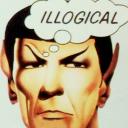Yahoo Answers is shutting down on May 4th, 2021 (Eastern Time) and beginning April 20th, 2021 (Eastern Time) the Yahoo Answers website will be in read-only mode. There will be no changes to other Yahoo properties or services, or your Yahoo account. You can find more information about the Yahoo Answers shutdown and how to download your data on this help page.
Trending News
Atheists, how did you arrive to your conclusion that God(s) do not exist?
I am working on a book for National Novel Writing Month and I am featuring a chapter on atheism. My goal is to shed light on what atheism really is and clear the air on some misnomers. Can you please share what, if anything, led you to arrive at an atheistic state?
Christians, Muslims, Hindus, pagans, and anyone else of any religion or spiritual path: What is your opinion of atheism (not atheists themselves)? I may use your opinion to help clear the air on atheism.
Note: my book isn't an actual novel since it's about spirituality and religion.
Please share specific details about your experience at arriving the conclusion. I am looking for various things to include in the book and I know only two atheists IRL. Would like to offer more than those two viewpoints.
@Atheist Cat thank you! That kind of detail is what I am looking for!
Thank you thank you thank you! I am getting some great stuff. I really appreciate it!
15 Answers
- Anonymous1 decade agoFavorite Answer
In an attempt to follow the command in 1st Peter, (1 Peter 3:15 But sanctify the Lord God in your hearts: and [be] ready always to [give] an answer to every man that asketh....) I began studying the Bible so that I could always be ready with an answer. It was through my studying that I began to realize that the Bible is nothing more than a work of fiction full of contradictions and errors. After reading the Bible through a few times and studying to understand it, I realized I could not believe it.
- Anonymous1 decade ago
Well, I don't know how sure I was about Christianity in the first place (I was raised by the more modern kind of Mennonites- not the horse and buggy types. My parents were less hardcore than everyone else in their families.), I think I probably accepted it as one of those "you'll understand when you're older" kind of things. I do remember being terrified by the concept of hell though. At some point, I'm going to say I was about nine or ten, I decided that if I was going to so the Christian thing I was going to do it right, I read the Children's Bible, I prayed, it was on my mind a lot.
I was a very good reader, so by the time I was about eleven I started reading Douglas Adams (prominent atheist, he likes to throw in jokes about the paradoxes of faith and religion into his work), Philip Pullman (can't remember if The Amber Spyglass was out yet though), and was probably having the seed of doubt planted in my mind. I was pretty determined to stay Christian though, and I read the proper adult's Bible, with all the nasty bits still in. Let's just say that it didn't live up to my expectations. I don't remember the exact thought process that brought it out, but I was at Bible Camp after I'd turned twelve and it suddenly just hit me that God wasn't real and all of this was nonsense. I'd definitely been trying so hard to believe because frankly I wasn't very good at accepting it without question, and being at Bible camp really made me face up to it, I think.
So yeah, after that I started becoming more accepting towards things that Bible says are wrong (but that I don't agree with) and I must say that it feels pretty good to say, for example, that my friend being trans-gendered is totally fine because it hurts nobody and not have to dig through bible passages to figure what God says about it and later if Jesus takes it back. It's pretty liberating in general. :)
- Sandy EgoLv 71 decade ago
I think there are (roughly speaking) two types of atheists: those who were initially raised with the belief in god and who through conscious examination reached the conclusion that god doesn't exist, and those raised in a non-believer environment where it's simply taken for granted that gods are a product of human need and imagination - not an objective reality. I belong to the latter class, as I grew up in the Soviet Union, where religion was pretty much considered to be the "opium for the masses". I never thought religion was "bad" - some of my favorite reading when I was a kid was all kinds of myths and legends, especially about the Greek, Roman and Egyptian gods. I also studied art history quite a bit, and a lot of Western art is infused with religious themes (think Rembrandt, for example), so in studying Western art I also learned about various biblical events. However, it never even occurred to me to view some myths as truths while discounting others as mere legends. Be it the Book of the Dead, the Bible, the Quran, or the tales of Zeus and Athena, I have always viewed them as an important part of our cultural heritage, but not in any way, shape or form as representations of objective reality. What I'm trying to get at is that there was no process by which I had consciously "arrived" at my atheistic state of mind - to me it has always been a given that the universe is governed by a set of physical laws, a lot of which we might not even be aware of, and invoking a supernatural power to explain anything has always seemed counter-intuitive and unnecessary.
The thing is, it's not even that I feel that god/gods "don't exist". Obviously, they exist - they exist in the minds of people who believe in them, and this existence is very powerful. Also, I don't deny an existence of something "greater than myself" - obviously, the universe we inhabit is so much greater than each of us (or even all of us taken together), and one doesn't need to believe in the supernatural to be humbled by the magnificent nature of it. In addition, I believe that there is a lot that remains unexplained, and perhaps some laws of nature will never be grasped fully by the human mind - however, once again, there's no logical connection between admitting that we can't know everything there is to know about our world and jumping to the conclusion that because we can't explain everything there must be a supernatural force in play. The most cursory examination of human history will reveal how once unexplained phenomena have been explained, demystified and often put to use in the most mundane everyday situations. My feeling is that the phenomena that seem utterly mysterious today will most likely be explained in due time, without resorting to the idea of the supernatural.
In general, I don't have a problem with the idea of believing in "something greater"; in a very general sense, I believe in the greatness of the universe, in the harmony of the laws of nature, I am awed by the things big and small that are a part of our world. I can be moved to tears by the sight of a beautiful sunset. But the more specific you get in defining a belief, the more nutty it's beginning to sound to my ears. I can live with believing in the greater laws of nature that are as of yet unknown to us (Theory of Everything, anyone?), but the specific rituals that are associated with just about any religion are a major turn-off. The wine in a cup is a real blood of some guy who died 2000 years ago? I mean, really? I'm sorry, but when you get down to details, it's very hard to take this stuff seriously.
In a nutshell, I was born and raised a non-believer, and I haven't found any compelling reason to reconsider my attitude. I'm not disputing the benefits that religion bestows on the society and on the individuals, but most likely I will never find the specifics of a belief plausible.
- Anonymous1 decade ago
The same way I came to the conclusion Thor, monkey-doughnut hybrids, and invisible donkeys that hide in peoples closet don't exist.
There's no valid evidence.
Well..if your looking for how I came to be an Atheist I'll tell you.
I was meditating at church in the junior section (ages 6 to 12).
Previously I would always imagine myself running towards a door, and I was told it was the door to god and that I should strive to reach it. Normally the door was white but occasionally it changes colors like red, brown, green, orange and purple. One day before meditation I spotted a spider traveling on the floor, and instead of the door I imagined a spider which changed colors just like the door, and then I started making patterns behind my eyelids- trees, spades, cars what have you.
I realized I can make myself see anything as long as I'm looking for it, and then realized the Bible has no more credibility than Where the Wild Things Are.
- How do you think about the answers? You can sign in to vote the answer.
- 1 decade ago
When I started to look for evidence and found none....
Atheism itself is simple, it's the non-belief in a god, there are many pathways to this. It really just took for me the time to learn a bit about how the world actually works. What we now to be true, and applied the same methodology to my theistic beliefs at the time. What I found was inconclusive, therefore without proof.
I then began to ask myself why I wanted to be a good person and realized that god's existance was irrelevant to that question. It was then when I understood that I didn't need a dogmatic faith to be an honest and good person. That's what I strive to be, not for any god, but for the benifit of myself and those around me that I care for....
- Robert AbuseLv 71 decade ago
There has never been anything presented that would suggest that any of mankind's thousands of gods have ever existed at any point in time.
It really is a matter of evidence, for gods there just isn't any.
For religions being bloodthirsty, aggressive, totalitarian political control systems, fired by the absolute greed of the elite and ruling classes, there is truck loads of evidence that I can see every day.
So, there are no gods, but there are vile political systems that require a belief in one or several to allow them to operate.
- ?Lv 71 decade ago
I have not "concluded" there is no god, I just do not have any belief in any gods. I am open to the possibility, but I do think it most likely that there are no gods for there is zero evidence of gods. I have, however, concluded that all of the "revealed gods" (the gods humans have named and worshiped and claim to "know") are products of human imagination, human ignorance, human fear, human need, human greed...
I once believed deeply as a fundamentalist Christian but after much observation and education, I came to no longer believe. I read the bible with a concordance at hand, studied the history of the Christian religion, the history of the bible, how it was edited and translated over time, studied other religions, studied mythology, psychology, biology, geology, archeology, sociology, and history. I observed human nature, I observed theist humans and nontheistic humans, I observed animals, I observed nature.
I find it interesting that the vast majority of the human population thinks it is quite normal to not believe in millions of ancient gods and goddesses and in millions of other mythical, legendary, and supernatural beings and creatures other humans once believed in, but not believing in any god perplexes them and causes them to treat us with suspicion and the assumption we cannot be moral and we may even be "of the devil".
The ONLY thing an atheist is is a person who has no belief in any deities. That's it. Beyond that, atheists, like theists, are individuals with their own individual thoughts, beliefs, experiences, morals, hopes, fears, etc.
“I contend that we are both atheists. I just believe in one fewer god than you do. When you understand why you dismiss all the other possible gods, you will understand why I dismiss yours.” --Stephen Roberts
By the way, a novel is a work of fiction, but that does not mean a novel canot be about spirituality and religion. Good luck with your writing.
~Ex-fundie-xian; former new ager; agnostic atheist
- 1 decade ago
It's really very very simple:
A complete lack of ANY reliable evidence for ANY God.
Yes there are anecdotes - in ALL faiths! Why assume only one category of anecdote are reliable but other aren't? I would expect there to be plenty of anecdotes in a Godless world.
Faith is often cited as good reason but faith means belief without evidence doesn't it? Again, why why why ASSUME intuition is a reliable means of ascertaining truth? WHY?
If you really want to know the answer in detail I strongly suggest you read a copy of 'The God Delusion' or 'Letter To A Christian Nation'. These lay out in exquisite detail why faith is not enough.
Please watch links - I'd be interested in hearing what YOU think of these...
Source(s): http://www.youtube.com/watch?v=eUB4j0n2UDU http://www.youtube.com/watch?v=qs3RKZjSzYg http://www.youtube.com/watch?v=fLbesxxKzcM - JamesLv 71 decade ago
Even as a child I was always sceptical of anything I could not see or discern with my other senses. Later on I began to read - both books on sciences, history, paleontology, etc, as well as religious books like the Bible, the Bhagavad Gita and such. I found religious books not only limited in their scope of knowledge but often completely incorrect about many things.
- 1 decade ago
atheism is the natural condition, we are all born atheist, superstition is a learnt behaviour.
which of the many religions you might end up adopting is determined predominantly by the geographical location of your birth and the religious inclinations of your parents.
it is highly unlikely you ever made a conscious choice about your religion; circumstances made you what you are.
have you heard that wonderful quote by steven weinberg?
"I contend that we are both atheists. I just believe in one fewer god than you do. When you understand why you dismiss all the other possible gods, you will understand why I dismiss yours"






